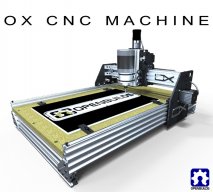OpenBuilds OX CNC Machine
Discussion in 'CNC Mills/Routers' started by Mark Carew, Dec 15, 2013.
OpenBuilds OX CNC Machine
Discussion in 'CNC Mills/Routers' started by Mark Carew, Dec 15, 2013.
OpenBuilds OX CNC Machine. A strong easy to build shop CNC router that can be sized to suit your needs. Many new features have been incorporated into the OX to make it a great router that is sure to inspire!
Page 95 of 124
Page 95 of 124
